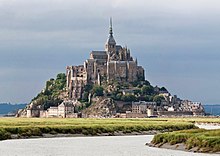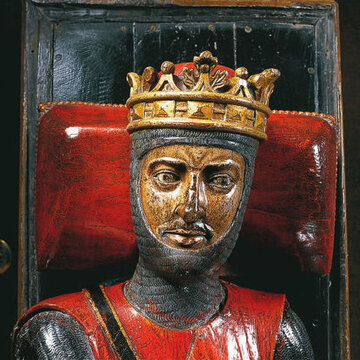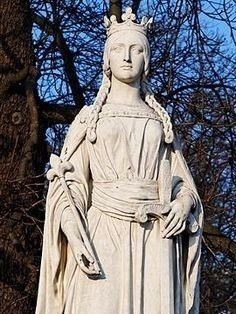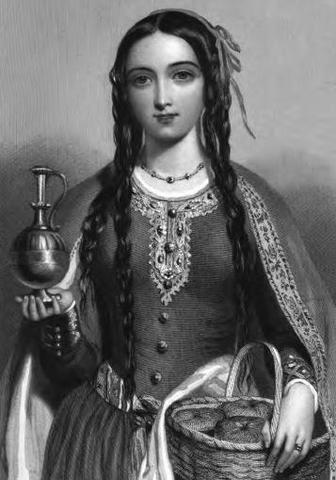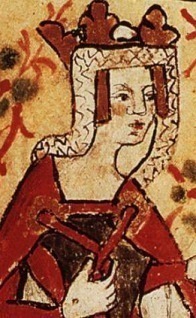Family tree Fröberg » King Henry I. 'Beauclerc' /of England (Henry, I., 'Beauclerc') Normandie (1068-1135)
Personal data King Henry I. 'Beauclerc' /of England (Henry, I., 'Beauclerc') Normandie
Sources 1, 2- First name Henry, I., 'Beauclerc'.
- He was born September 1068 in Selby, Yorkshire, England.
- He died on December 1, 1135 in Eure, Normandy, France, he was 67 years old.
Cause of death: Food poisoning
- A child of William I (Guillaume) 'The Conqueror' (Willem de Veroveraar) de Normandie and Matilda (Mathilda) (Maud) van Vlaanderen (Flanders)
Household of King Henry I. 'Beauclerc' /of England (Henry, I., 'Beauclerc') Normandie
![]() Attention: Partner (Adeliza / Adela / Adelheid van Leuven) is 35 years younger.
Attention: Partner (Adeliza / Adela / Adelheid van Leuven) is 35 years younger.
(1) He is married to Ansfride / Ansfrida.
They got married.
Child(ren):
- Juliana Fontevrault de Fontevrault 1090-1136
- Foulques / Fulk / Fulco FitzRoy 1100-????
- Richard of Lincoln (England) 1101-1120
(2) He is married to Matilda / Mathilda / Mathilde / Edith of Scotland.
They got married on November 11, 1100 at London, England, he was 32 years old.
Westminster Abbey
Child(ren):
(3) He is married to Adeliza / Adela / Adelheid van Leuven.
They got married.
Notes about King Henry I. 'Beauclerc' /of England (Henry, I., 'Beauclerc') Normandie
Henry I (c. 1068 – 1 December 1135), also known as Henry Beauclerc, was King of England from 1100 to his death in 1135. He was the fourth son of William the Conqueror and was educated in Latin and the liberal arts. On William's death in 1087, Henry's elder brothers Robert Curthose and William Rufus inherited Normandy and England, respectively, but Henry was left landless. He purchased the County of Cotentin in western Normandy from Robert, but his brothers deposed him in 1091. He gradually rebuilt his power base in the Cotentin and allied himself with William against Robert.
Present at the place where his brother William died in a hunting accident in 1100, Henry seized the English throne, promising at his coronation to correct many of William's less popular policies. He married Matilda of Scotland and they had two surviving children, William Adelin and Empress Matilda; he also had many illegitimate children by his many mistresses. Robert, who invaded in 1101, disputed Henry's control of England; this military campaign ended in a negotiated settlement that confirmed Henry as king. The peace was short-lived, and Henry invaded the Duchy of Normandy in 1105 and 1106, finally defeating Robert at the Battle of Tinchebray. Henry kept Robert imprisoned for the rest of his life. Henry's control of Normandy was challenged by Louis VI of France, Baldwin VII of Flanders and Fulk V of Anjou, who promoted the rival claims of Robert's son, William Clito, and supported a major rebellion in the Duchy between 1116 and 1119. Following Henry's victory at the Battle of Brémule, a favourable peace settlement was agreed with Louis in 1120.
Considered by contemporaries to be a harsh but effective ruler, Henry skilfully manipulated the barons in England and Normandy. In England, he drew on the existing Anglo-Saxon system of justice, local government and taxation, but also strengthened it with additional institutions, including the royal exchequer and itinerant justices. Normandy was also governed through a growing system of justices and an exchequer. Many of the officials who ran Henry's system were "new men" of obscure backgrounds rather than from families of high status, who rose through the ranks as administrators. Henry encouraged ecclesiastical reform, but became embroiled in a serious dispute in 1101 with Archbishop Anselm of Canterbury, which was resolved through a compromise solution in 1105. He supported the Cluniac order and played a major role in the selection of the senior clergy in England and Normandy.
Henry's son William drowned in the White Ship disaster of 1120, throwing the royal succession into doubt. Henry took a second wife, Adeliza of Louvain, in the hope of having another son, but their marriage was childless. In response to this, he declared his daughter Matilda his heir and married her to Geoffrey of Anjou. The relationship between Henry and the couple became strained, and fighting broke out along the border with Anjou. Henry died on 1 December 1135 after a week of illness. Despite his plans for Matilda, the King was succeeded by his nephew, Stephen of Blois, resulting in a period of civil war known as the Anarchy.
Early life, 1068–1099[edit]
Childhood and appearance, 1068–86[edit]
Henry was probably born in England in 1068, in either the summer or the last weeks of the year, possibly in the town of Selby in Yorkshire.[1][nb 1] His father was William the Conqueror, the Duke of Normandy who had invaded England in 1066 to become the King of England, establishing lands stretching into Wales. The invasion had created an Anglo-Norman ruling class, many with estates on both sides of the English Channel.[2] These Anglo-Norman barons typically had close links to the kingdom of France, which was then a loose collection of counties and smaller polities, under only the nominal control of the king.[3] Henry's mother, Matilda of Flanders, was the granddaughter of Robert II of France, and she probably named Henry after her uncle, King Henry I of France.[4]
Henry was the youngest of William and Matilda's four sons. Physically he resembled his older brothers Robert Curthose, Richard and William Rufus, being, as historian David Carpenter describes, "short, stocky and barrel-chested," with black hair.[5] As a result of their age differences and Richard's early death, Henry would have probably seen relatively little of his older brothers.[6] He probably knew his sister Adela well, as the two were close in age.[7] There is little documentary evidence for his early years; historians Warren Hollister and Kathleen Thompson suggest he was brought up predominantly in England, while Judith Green argues he was initially brought up in the Duchy.[8][nb 2] He was probably educated by the Church, possibly by Bishop Osmund, the King's chancellor, at Salisbury Cathedral; it is uncertain if this indicated an intent by his parents for Henry to become a member of the clergy.[10][nb 3] It is also uncertain how far Henry's education extended, but he was probably able to read Latin and had some background in the liberal arts.[11] He was given military training by an instructor called Robert Achard, and Henry was knighted by his father on 24 May 1086.[12]
Inheritance, 1087–88[edit]
In 1087, William was fatally injured during a campaign in the Vexin.[13] Henry joined his dying father near Rouen in September, where the King partitioned his possessions among his sons.[14] The rules of succession in western Europe at the time were uncertain; in some parts of France, primogeniture, in which the eldest son would inherit a title, was growing in popularity.[15] In other parts of Europe, including Normandy and England, the tradition was for lands to be divided up, with the eldest son taking patrimonial lands – usually considered to be the most valuable – and younger sons given smaller, or more recently acquired, partitions or estates.[15]
In dividing his lands, William appears to have followed the Norman tradition, distinguishing between Normandy, which he had inherited, and England, which he had acquired through war.[16] William's second son, Richard, had died in a hunting accident, leaving Henry and his two brothers to inherit William's estate. Robert, the eldest, despite being in armed rebellion against his father at the time of his death, received Normandy.[17] England was given to William Rufus, who was in favour with the dying king.[17] Henry was given a large sum of money, usually reported as £5,000, with the expectation that he would also be given his mother's modest set of lands in Buckinghamshire and Gloucestershire.[18][nb 4] William's funeral at Caen was marred by angry complaints from a local man, and Henry may have been responsible for resolving the dispute by buying off the protester with silver.[20]
Robert returned to Normandy, expecting to have been given both the Duchy and England, to find that William Rufus had crossed the Channel and been crowned king.[21] The two brothers disagreed fundamentally over the inheritance, and Robert soon began to plan an invasion of England to seize the kingdom, helped by a rebellion by some of the leading nobles against William Rufus.[22] Henry remained in Normandy and took up a role within Robert's court, possibly either because he was unwilling to side openly with William Rufus, or because Robert might have taken the opportunity to confiscate Henry's inherited money if he had tried to leave.[21][nb 5] William Rufus sequestered Henry's new estates in England, leaving Henry landless.[24]
In 1088, Robert's plans for the invasion of England began to falter, and he turned to Henry, proposing that his brother lend him some of his inheritance, which Henry refused.[25] Henry and Robert then came to an alternative arrangement, in which Robert would make Henry the count of western Normandy, in exchange for £3,000.[25][nb 6] Henry's lands were a new countship based around a delegation of the ducal authority in the Cotentin, but it extended across the Avranchin, with control over the bishoprics of both.[27] This also gave Henry influence over two major Norman leaders, Hugh d'Avranches and Richard de Redvers, and the abbey of Mont Saint-Michel, whose lands spread out further across the Duchy.[28] Robert's invasion force failed to leave Normandy, leaving William Rufus secure in England.[29]
Count of the Cotentin, 1088–90[edit]
Depiction of Bishop Odo (wielding club at centre) who imprisoned Henry from 1088–;89. From the Bayeux Tapestry.Henry quickly established himself as count, building up a network of followers from western Normandy and eastern Brittany, whom historian John Le Patourel has characterised as "Henry's gang".[30] His early supporters included Roger of Mandeville, Richard of Redvers, Richard d'Avranches and Robert Fitzhamon, along with the churchman Roger of Salisbury.[31] Robert attempted to go back on his deal with Henry and re-appropriate the county, but Henry's grip was already sufficiently firm to prevent this.[32] Robert's rule of the Duchy was chaotic, and parts of Henry's lands became almost independent of central control from Rouen.[33]
During this period, neither William nor Robert seems to have trusted Henry.[34] Waiting until the rebellion against William Rufus was safely over, Henry returned to England in July 1088.[35] He met with the King but was unable to persuade him to grant him their mother's estates, and travelled back to Normandy in the autumn.[36] While he had been away, however, Odo, Bishop of Bayeux, who regarded Henry as a potential competitor, had convinced Robert that Henry was conspiring against the duke with William Rufus.[37] On landing, Odo seized Henry and imprisoned him in Neuilly-la-Forêt, and Robert took back the county of the Cotentin.[38] Henry was held there over the winter, but in the spring of 1089 the senior elements of the Normandy nobility prevailed upon Robert to release him.[39]
Although no longer formally the Count of Cotentin, Henry continued to control the west of Normandy.[40] The struggle between his brothers continued. William Rufus continued to put down resistance to his rule in England, but began to build a number of alliances against Robert with barons in Normandy and neighbouring Ponthieu.[41] Robert allied himself with Philip I of France.[42] In late 1090 William Rufus encouraged Conan Pilatus, a powerful burgher in Rouen, to rebel against Robert; Conan was supported by most of Rouen and made appeals to the neighbouring ducal garrisons to switch allegiance as well.[43]
Robert issued an appeal for help to his barons, and Henry was the first to arrive in Rouen in November.[44] Violence broke out, leading to savage, confused street fighting as both sides attempted to take control of the city.[44] Robert and Henry left the castle to join the battle, but Robert then retreated, leaving Henry to continue the fighting.[45] The battle turned in favour of the ducal forces and Henry took Conan prisoner.[45] Henry was angry that Conan had turned against his feudal lord. He had him taken to the top of Rouen Castle and then, despite Conan's offers to pay a huge ransom, threw him off the top of the castle to his death.[46] Contemporaries considered Henry to have acted appropriately in making an example of Conan, and Henry became famous for his exploits in the battle.[47]
Fall and rise, 1091–99[edit]
Do you have supplementary information, corrections or questions with regards to King Henry I. 'Beauclerc' /of England (Henry, I., 'Beauclerc') Normandie?
The author of this publication would love to hear from you!
Timeline King Henry I. 'Beauclerc' /of England (Henry, I., 'Beauclerc') Normandie
This functionality is only available in Javascript supporting browsers.Click on the names for more info. Symbols used:grandparents
parents
brothers/sisters
children
Ancestors (and descendant) of Henry I. 'Beauclerc' /of England Normandie
Henry I. 'Beauclerc' /of England Normandie
1068-1135Ansfride / Ansfrida
1070-????
Sources
- WikiTree, via https://www.myheritage.nl/research/colle...
Henry Henry I Beauclerc, FitzWilliam, King of England of England (geboren Normandie de Normandie)<br>Geslacht: Man<br>Geboorte: sep 1068 - Selby, Yorkshire, England<br>Huwelijk: 29 jan 1121 - Windsor Castle, Berkshire, England<br>Huwelijk: 11 nov 1100 - Westminster Abbey<br>Overlijden: 1 dec 1135 - Eure, Normandy, France<br>Vader: Guillaume William I the Conqueror Duke of Normandy, King of England de Normandie (geboren Normandie)<br>Moeder: Mathilde Matilda Maud, Duchess of Normandy of England (geboren Flandre de Flandre, Flanders, Normandie)<br>Echtgenote(n/s): Ansfride Ansfrida de Seacourt (geboren UNKNOWN)Adeliza Adela Queen of England of Louvain (geboren Brabant d'Aubigny)Eadgith Matilda Maud, Edith of Scotland (geboren Dunkeld Caenmor, Canmore, Atheling, Beauclerk.)<br>Kinderen: Richard of Lincoln (geboren England)Juliana de Breteuil (geboren Fontevrault de Fontevrault)Foulques Fulk FitzRoyEuphemia of EnglandMatilda Maud Holy Roman Empress, Lady of the English de Anjou (geboren Normandie of England)William Adeline, Atheling, Duke of Normandy of England (geboren Normandie)Henry FitzRoy<br>Broers/zusters: Cecily Cecile of England (geboren England Normandy)Mathilda Maud of England (geboren England Normandie, Flandres)Agatha of England (geboren England)Adele Adela Comtesse de Blois de Blois (geboren Normandie)Constance de Bretagne (geboren Normandie of England)William William II Rufus King of England of England (geboren Normandie)Adeliza Adelaide Normandie of NormandyRobert Robert II Curthose Duke of Normandy of Normandy (geboren Normandie)Richard Duke of Bernay de Normandie (geboren Normandie)<br>Foto's:www.wikitree.com- Biografische Samenvattingen van Opmerkelijke Mensen, via https://www.myheritage.nl/research/colle...
Henry I of England<br>Geslacht: Man<br>Geboorte: sep 1068 - Selby<br>Overlijden: Cause of death: Food poisoning - 1 dec 1135 - Lyons-la-Forêt<br>Huwelijk: Partner: Matilda of Scotland - 11 nov 1100 - Westminster Abbey<br>Huwelijk: Partner: Adeliza of Louvain - jan 1121 - Windsor Castle<br>Unie: , Partner: Adeliza of Louvain - 24 jan 1121<br> Familieleden: RelatieNaamGeboorteVaderWilliam The Conqueror1028MoederMatilda of Flanders1031DochterEmpress Matilda7 feb 1101ZoonWilliam Adelin5 aug 1103DochterSybilla of Normandy1092ZoonRobert, 1st Earl of Gloucester1100ZoonGilbert FitzroyZoonRobert Fitzedith, Lord Okehampton1122ZoonFulk Fitzroy1092ZoonReginald De Dunstanville, 1st Earl of Cornwall1110DochterMatilda Fitzroy, Abbess of MontvilliersZoonHenry Fitzroy1103DochterAlice FitzroyDochterMatilda Fitzroy, Countess of PercheBroerWilliam II of England1056BroerRobert Curthose1050BroerRichard of NormandyZusterAdela of Normandy1067EchtgenoteMatilda of Scotland1080EchtgenoteAdeliza of Louvain1103De records in deze verzameling variëren volgens de aanwezige data-items en men zal informatie vinden over de verschillende aspecten van het onderwerp personen, waaronder namen, biografische beschrijvingen, nationaliteiten, geboortedata, geboorteplaatsen, overlijdensdatum, overlijdensplaats, familieleden, echtgenoten, kinderen beroepen en opleidingsniveau. De informatie in deze collectie is afkomstig van Freebase (onder de CC-BY) en Wikipedia (onder de GNU Free Documentation License).Matches in other publications
This person also appears in the publication: Same birth/death day
- 1018 » Thietmar of Merseburg, German bishop (b. 975)
- 1135 » Henry I, king of England (b. 1068)
- 1241 » Isabella of England, Holy Roman Empress (b. 1214)
- 1255 » Muhammad III of Alamut, Nizari Ismaili Imam
- 1335 » Abu Sa'id Bahadur Khan, Mongol ruler of the Ilkhanate (b. 1305)
- 1374 » Magnus Ericson, king of Sweden (b. 1316)
About the surname Normandie
- View the information that Genealogie Online has about the surname Normandie.
- Check the information Open Archives has about Normandie.
- Check the Wie (onder)zoekt wie? register to see who is (re)searching Normandie.
The Family tree Fröberg publication was prepared by Gerhard Arian Fröberg.When copying data from this family tree, please include a reference to the origin:
Gerhard Arian Fröberg, "Family tree Fröberg", database, Genealogy Online (https://www.genealogieonline.nl/stamboom-froberg/I505686.php : accessed June 1, 2024), "King Henry I. 'Beauclerc' /of England (Henry, I., 'Beauclerc') Normandie (1068-1135)".


